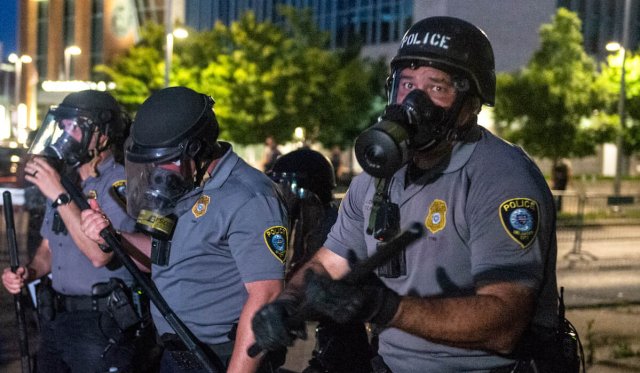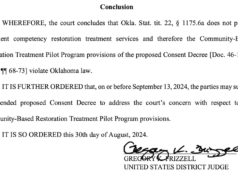
The U.S. Department of Justice has opened a civil rights investigation into whether the state of Oklahoma — and specifically the City of Oklahoma and the OKC Police Department — have failed “to provide community-based mental health services to people in Oklahoma County, leading to unnecessary admissions to psychiatric facilities and police contact.”
According to the federal agency’s press release, the investigation “will also examine Oklahoma City’s systems for responding to people experiencing behavioral health crises, including through the 911 call center and the Oklahoma City Police Department.”
“Community-based mental health services, which are proven effective in transforming people’s lives, are critical to preventing a cycle of unnecessary institutionalization and avoidable contacts with law enforcement,” Assistant Attorney General Kristen Clarke of the Justice Department’s civil rights division said in the release. “The civil rights division is committed to ensuring appropriate responses to behavioral health crises and protecting the civil rights of people with mental health disabilities.”
The DOJ investigation stems from a formal complaint filed by the American Civil Liberties Union and the Oklahoma Disability Law Center, according to statements released by those organization’s leaders late Friday. The two nonprofit entities jointly filed their complaint earlier this year, alleging “unnecessary segregation of persons with mental illness in Oklahoma County and the County’s heavy reliance on law enforcement to respond to mental health crises,” according to their press release.
“While our complaint was specific to Oklahoma County, we believe this to be a statewide problem, and we hope this investigation will lead to statewide changes that will greatly improve the mental health service system for all Oklahomans.” said Brian Wilkerson, director of legal services for the law center. “The Oklahoma County Detention Center has become a revolving door for people experiencing mental health crises, and we see similar situations across the state.”
OKCPD Chief Wade Gourley released a statement Thursday afternoon saying that his department had not been provided specific information regarding details of the investigation.
“We intend to cooperate with the USDOJ and look forward to working with them toward the goal of providing the safest and most effective ways of responding to these types of calls,” Gourley said.
Mark Nelson, president of the Oklahoma City Fraternal Order of Police, also released a statement Thursday afternoon.
“Every day Oklahoma City police officers handle mental health-related calls with the utmost professionalism. Our officers implement their training and often bring stressful situations to a peaceful conclusion. Officers frequently go the extra mile to ensure the people in crisis get the resources they need,” Nelson said. “The men and women who selflessly train, practice and prepare for this area of policing are to be commended. More training and additional resources to ensure we recruit and retain the best officers are always welcome. We are confident any investigation will show the work our officers do every day is in line with state and federal law.”
Fatal OKCPD shootings raise questions
In recent years, the Oklahoma City Police Department has been under scrutiny for the deaths of three men who were shot by police while experiencing mental health crises. Questions have also been raised about department policies and procedures, as outlined in a lengthy list of recommendations from the consulting firm 21CP Solutions.
The three fatal shootings have resulted in criminal charges brought by Oklahoma County District Attorney David Prater. Two of the cases involved mental health crises, with a jury convicting an officer in one of the cases.
In November 2017, OKCPD officers shot and killed Dustin Pigeon, 29, after officers were called to his apartment in southwest Oklahoma City because Pigeon had threatened to kill himself in a call to 911. When officers arrived, Pigeon, holding a can of lighter fluid and a lighter, threatened to set himself on fire.
Pigeon was intoxicated at the time, and when officers asked him to put down the lighter and lighter fluid, he refused. Officer Keith Sweeney was the third officer to arrive on the scene, shouting additional commands before shooting Pigeon five times with his pistol, including once in the heart. Sweeney shot Pigeon immediately after another officer had shot Pigeon in the hip with a non-lethal bean bag.
Sweeney, who also operated a clothing company that touted the “Warrior Mindset” and sold items proclaiming “Stay Fit Stay Dangerous,’ was convicted of second degree murder in 2019.
In December 2020, OKCPD Sgt. Clifford Holman shot and killed Bennie Edwards, a 60-year-old man who experienced homelessness and psychosis. Officers responded to a call regarding Edwards having a knife outside of a northwest OKC grocery store. As in the Pigeon shooting, the third officer to respond to the scene — Holman — fired the fatal shots, striking Edwards in the back after he moved toward officers and then turned and ran away. At the time he was killed, Edwards had stuffed his ears with fabric.
In May 2021, OKCPD officer Daniel Lopez fatally shot Daniel Hobbs, a 34-year-old man who said he had a schizophrenia diagnosis. A neighbor had called 911 after seeing Hobbs standing in his grandfather’s yard. Lopez attempted to take Hobbs into custody, wrestling with him before fatally shooting Hobbs after he said Hobbs reached for his taser.
Although the case did not involve a call for mental health services, OKCPD officers also fatally shot 15-year-old Stavian Rodriguez in November 2020 after he had surrendered during a robbery, dropped his handgun and reached toward his pants. Prater charged five officers with manslaughter, but he did not charge a sixth officer who had shot Rodriguez with a non-lethal round. The charges are pending.
Hamon: OKC should have addressed issues
OKC Ward 6 Councilwoman JoBeth Hamon, a mental health advocate who has criticized OKCPD activities and clashed with the department’s union, said the City Council should have been working to improve municipal mental health crisis response already.
“I find it frustrating that this has escalated to the level of a DOJ investigation when [the City Council] could have been taking a more active role in appropriate response to behavioral health crises, especially because we have recommendations from 21CP (consultants) to do so,” Hamon said. “Instead of prioritizing changes systemically and looking at examples from other communities that have had success, those recommendations have languished because there isn’t the collective will at the Council level to prioritize change in this area. Instead, we’ve heard that changes are happening with no data or evidence that we are truly diverting people from unnecessary hospitalization or criminalization.”
According to the DOJ press release, the federal investigation is being conducted pursuant to Title II of the Americans with Disabilities Act, which prohibits disability discrimination by state and local governments. The release stated that the investigation is also being conducted pursuant to the Violent Crime Control and Law Enforcement Act of 1994, which prohibits state and local governments from engaging in a pattern or practice of conduct by law enforcement officers that deprives individuals of rights protected by the Constitution or federal law.
In the release, the federal agency asked people with information relevant to the investigation to contact the department at
MentalHealth.Oklahoma@usdoj.gov or through its website.
(Update: This article was updated at 2:05 p.m. Thursday, Nov. 17, to include comment from Gourley. It was updated again at 3:52 p.m. to include comment from Nelson. It was updated a final time at 11:30 a.m. Sunday, Nov. 20, to include additional information about the origin of the Department of Justice investigation.)





















